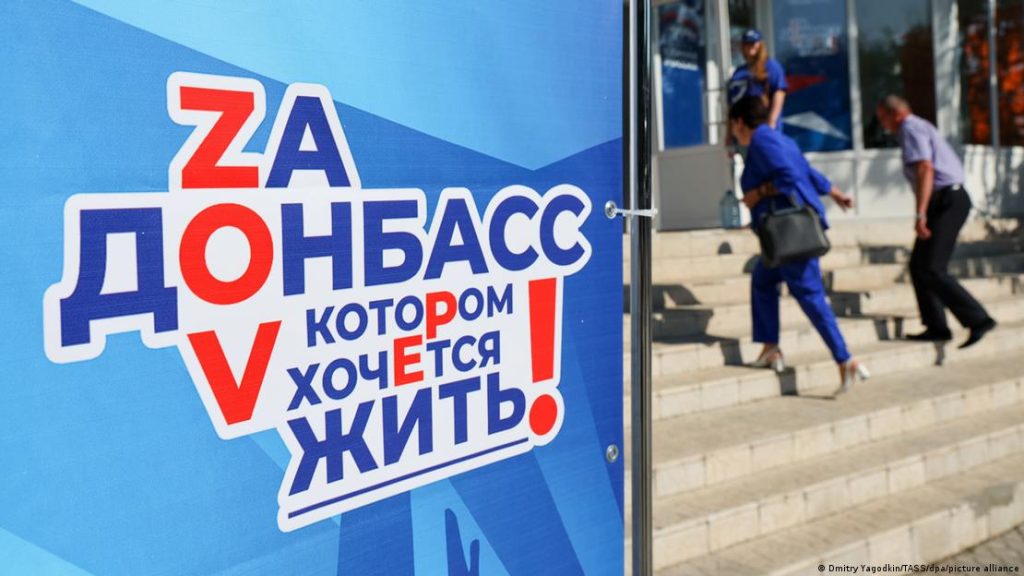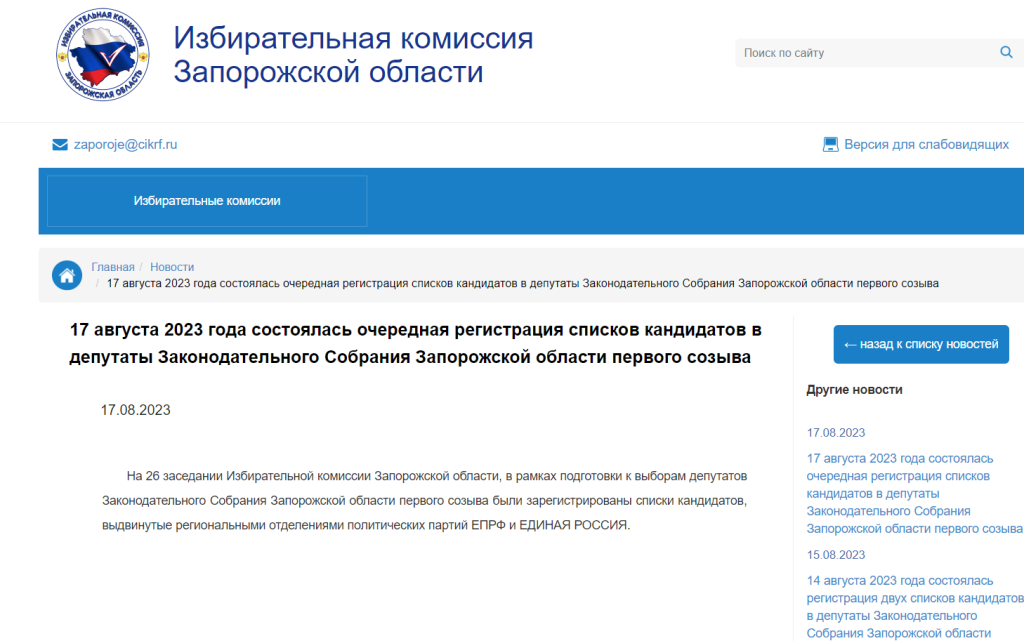How and why the Kremlin is holding "elections" in the occupied territories

We are fully aware that the elections, as well as any manifestation of the official will of the people in Russia, are only a simulacrum from the point of view of civilised legal norms and common sense. Their consequences cannot be anything other than another violation of international law and further delegitimisation of the Kremlin regime. This is especially true of the occupied territories, where the local population is actually held hostage.
How can you describe this pseudo-election process, what are its peculiarities, and what difficulties do the occupiers face?
This is not the first time that RF has held all-Russian “votes” in the occupied territories of Ukraine. First, it concerned the voting for the so-called amendments to the Russian Constitution in the summer of 2020, and then the elections to the State Duma in December 2021, 3 months before the current phase of the invasion of Ukraine. All these “votes” were held in the occupied parts of Donetsk and Luhansk regions and in the Crimea using different technologies.
This time, the list of territories where the Russians hope to hold the so-called elections includes the part of Donbas seized after February 2022 and the parts of Zaporizhzhia and Kherson regions under their control. The peculiarity is that it is the local authorities that are to be “elected” in the Russian legislative field.
Several problems forced the occupiers to change the “voting” system
In the annexed territories, the occupation administrations will not be able to organise “elections” according to the same standards as in the regions of Russia for a number of reasons:
- proximity of the front line and the Ukrainian counter-offensive;
- lack of control over the entire territory for which the “elections” are formally being held;
- lack of a complete understanding of the number of voters and their loyalty;
- security of candidates and election commissioners.
Because of these factors, the changes had to be made on the fly. But this was obvious even before. The experience of the so-called “referendum” on joining Russia, held in the occupied territories, was evident. After that, the occupiers lost Kherson and the entire right bank of the Dnipro River. This experience has already shown how the situation can change, after which it will be necessary to look for explanations when the military factor does not always coincide with the Kremlin’s political plans.
Even now, the Kremlin’s curators of the occupied territories have been trying to find hybrid methods of campaigning. These would include both a more closed nature of the election campaign and floating territorial and time limits for its conduct.
Another factor was the fact that Moscow involved fugitive politicians from Viktor Yanukovych’s time, such as Dmytro Tabachnyk, or Russian politicians, including State Duma deputy and deputy head of the United Russia faction Igor Kostyukevich. The latter is an obvious creation of the First Deputy Head of the Russian Presidential Administration, Sergei Kiriyenko. In general, it has become a common practice to appoint people associated with him to the occupation administrations. Obviously, it is aimed at increasing their own influence in these territories.
In July 2023, the occupation authorities refused to hold direct governors’ elections in the occupied regions. Thus, it has already been announced that in the occupied parts of Donetsk and Luhansk regions, governors will not be elected directly, but by voting in local legislative gatherings from among several candidates proposed by the Kremlin.
The “elections” themselves, which allegedly cannot be held on the territory under martial law, were nevertheless decided to be held, but in places approved by the Russian security forces. Obviously, this is due to the fact that the front line may shift by the time the “elections” begin, and some of the areas where they were planned to be held may no longer be controlled by the occupiers.
A system of extraterritorial polling stations has been created that will operate throughout Russia. People who have left or have been taken out of the occupied territories will be able to vote there. Undoubtedly, the Russian authorities will create conditions for maximum coercion to participate in the voting in the regions.
In addition, polling stations will be set up in the occupied regions themselves for participants in the so-called special military operation (as the Kremlin calls this stage of the invasion of Ukraine). This means that Russian military personnel will be able to take part in the “elections” of local authorities for the regions where they come from.
The duration of the voting itself is extended in time. An early voting system has been introduced in the occupied territories of Ukraine. This system is provided by Russian legislation for hard-to-reach regions of Russia. Thus, in 2023, early voting will be held in some districts of the Republic of Sakha (Yakutia), Krasnoyarsk Krai, Murmansk Region, Khanty-Mansi, Chukotka, and Yamalo-Nenets Autonomous Okrugs. The occupied territories of Ukraine will start voting early on 31 August 2023. Obviously, the occupiers hope to maximise the attendance of the local population by holding the vote within ten days.
In the occupied territories, the Russian authorities are hiding both the composition of polling stations and the lists of candidates nominated by Russian parties. This is due to fears for the safety of candidates and organisers of the electoral process, especially local collaborators.

What for?
The simplest explanation for the organisation of formal integration processes in the occupied territories by the Russian occupation authorities is the desire to regulate the legal status of these territories in accordance with the Russian regulatory framework. This not only simplifies the management of these territories, but also self-legitimises the annexation and further steps towards the absorption of Ukrainian territory, forcing citizens to live there and continuing armed aggression.
These actions are in line with the logic of the Russian authorities’ decision on the integration processes of the annexed territories. In particular, the so-called Agreements on the Accession of the Occupied Territories to the Federation, as well as the Resolution of the Constitutional Court of Russia of 2 October 2022, which provides for a “transition period” for the annexed territories until 2026. This resolution refers to the need to hold these local elections in September 2023.
Russian propaganda actively uses the issues of elections and referendums, as well as the distribution of humanitarian aid or evacuation in the occupied territories. The image of people participating in mass events organised by the occupiers is used both for demonstration in Russia’s internal information field and for information operations abroad or in Ukraine itself.
Various “elections” in the occupied territories are always used as a method of control, population census, identification of “unreliable elements” among the local population, and acceleration of passport issuance. Instead, in this way, a larger number of people can always be attracted to cooperate with the occupation administrations and collaborators.
The so-called elections and the formation of the government apparatus on their basis will help the occupiers to systematise control over the occupied territories in accordance with the representation of the groups of influence that have interests there. Vesting official powers in representatives of the occupation administration allows for greater integration of “exiled” people into the regional governance system, flushing out local collaborators. This process has been gradually taking place in the parts of Donbas occupied since 2014 and has accelerated now.
Interestingly, at the end of August 2023, Putin signed Decree No. 641, according to which:
- in the so-called LPR, DPR and the occupied parts of Kherson and Zaporizhzhia regions, so-called Defence Headquarters will be established;
- in the Russian regions where the medium level of response has been introduced (Crimea, Krasnodar Territory, Sevastopol, Belgorod, Bryansk, Rostov, Kursk, Voronezh regions), regional operational headquarters will be responsible for ensuring the approval of the use of forces and means of the Russian Armed Forces, Rosgvardia, Emergencies Ministry, Ministry of Internal Affairs and the FSB in these territories. All these forces (except for the FSB) are subordinated to these headquarters).
That is, all armed units located in these Russian regions are now directly subordinated to these headquarters. This also applies to the “specialised state unitary enterprises”, which are in fact their own pocket armies in the “problematic” Russian regions, created by local authorities.
In this way, the Kremlin creates an additional method of control over all armed units in the regions and an additional safeguard against their use regardless of the position of local legislatures and governors.
What’s next?
It is logical that the holding of “elections” and the formation of certain government bodies will affect the course of hostilities and Ukraine’s efforts to liberate the occupied territories. These are factors that are generally on different planes.
By forming a “legitimate” government in the occupied territories, the Kremlin will try to sell it to the world as a factor in mitigating the reaction to the occupation, a factor in finding compromises. The effectiveness of such means is questionable even from the point of view of the position of regimes friendly to Moscow. However, the Russian regime constantly uses the practice of elevating its puppets to the level of international public figures. A striking example is the historic Minsk Agreements and the signature of Russia’s proxies.
The so-called elections will result in increased pressure on the local population, which will include passportisation, the removal of children, the settlement of newcomers from Russian regions, and the forced involvement of people in cooperation with the occupation authorities to ensure survival. Repressive measures against those identified as disloyal will only intensify.
“Elected” representatives of the authorities will become legitimate targets for Ukrainian special services.
Поділитись
